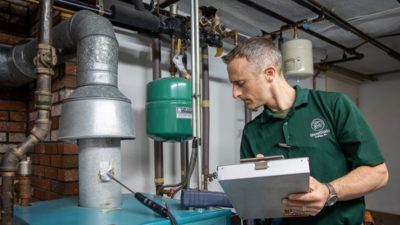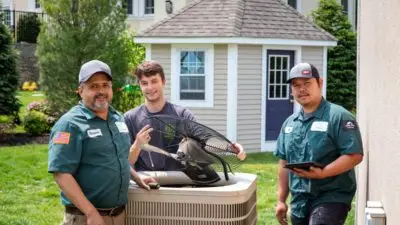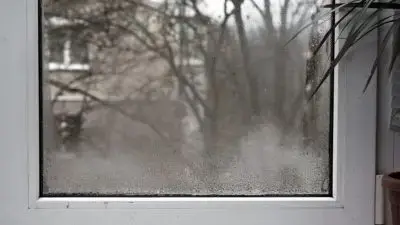Have you ever wondered what the secret is to saving money and energy at home? It’s not as hard or as complicated as you might think! Lowering the amount of energy you use at home on a daily basis helps to decrease the carbon emissions you are putting into the environment and it saves you money year-round, without losing the comfort that you’ve become accustomed to! Here’s how your neighbors, co-workers, and friends are saving and how you can follow in their footsteps.
They Understand How Their Home Uses Energy
Your neighbors who have low energy costs truly understand how their home consumes energy and how their personal habits play a role in their energy consumption. They understand their energy bills and they know what to expect every month. It doesn’t take energy efficiency knowledge or a deep understanding of how a house works. All you really need is a desire to learn! For example, the Mass Save® program is designed to do just that; it educates Massachusetts homeowners and renters about their home and provides a customized report and energy-saving recommendations. A Home Energy Assessment comes with a lot of benefits such as 100% off air sealing, 75% off approved insulation upgrades, access to 0% financing on heating and cooling equipment, and no-cost items like programmable thermostats and advanced power strips. Sign up here to get one step closer to understanding your home.
They Use the Environment
People with low energy use put off turning on their heating and cooling systems until it’s absolutely necessary. One trick is to use your windows to your advantage in all seasons. On summer days, close your curtains on sun-facing windows to turn away some of the heat. In the winter, do the opposite! Keep the curtains open to let in the warmth of the daytime and close them at night to keep the warmth inside while you sleep. You can also consider options like awnings or shutters that will help to reduce heat gain in the summer and decrease heat loss in the winter. If you want to go big, dream about passive solar home design for your next home. A properly oriented home that uses strategically placed materials like concreate, tile, brick, and stone can decrease your home’s energy use in a big way. (Just make sure the sun can reach them!) Want to do something to your home now? Invest in landscaping that will shade your windows from the summer sun, deflect winter winds, and channel summer breezes right toward your home!
They Program Their Thermostat
A programmable thermostat can help families take control of their energy consumption by easily customizing temperature settings according to unique lifestyle habits. You can decrease your energy costs through automatic settings that lower the temperature while you’re sleeping at night and return it to your comfort level before you wake in the morning. It also helps to regulate energy when you’re away from home, at work for the day, or even on vacation. When you sign up for a no-cost virtual Home Energy Assessment, you become eligible for programmable thermostats at no-cost to you and you also get access to a $100 rebate off smart thermostats! The sponsors of the Mass Save program make it easy to make energy efficiency upgrades to your home without breaking the bank.
They Seal Their Home
If you have drafty rooms in your home, places that are notoriously hotter or colder than the rest of the house, or high energy costs, it’s likely that your home needs air sealing and insulation upgrades. Consider insulation your home’s winter sweater and air sealing your home’s windbreaker. Together, they provide a complete seal from the outdoor elements and they stop unwanted heat, cold, and air from traveling uncontrollably in and out of your home. The sponsors of the Mass Save program are offering eligible Massachusetts residents 100% off air sealing and 75-100% off approved insulation upgrades to combat home energy loss. All you have to do is sign up for an easy no-cost Home Energy Assessment, and an energy expert will give you a custom report of your home and specific recommendations to improve its energy efficiency like air sealing and insulation. When your home is sealed the right way, you will not only see an impact on your energy usage but you’ll also feel a difference in comfort when it comes to your current trouble areas.
They Clean the Smart Way
Our daily habits not only affect our energy use and the costs associated with consumption, but it also impacts the planet in a big way as we release toxic carbon emissions into the atmosphere. If you’re doing laundry, wash clothes in cold water and air dry them, if possible. If you’re going to use a dryer, use a low heat setting and do multiple loads consecutively so that you can “reuse” the heat that is leftover from the previous load that just finished drying. Other tips like only running your dishwasher when it’s full and not overstuffing your washer/dryer, are ways that you can alter your weekly habits to match your energy efficiency goals. Many times it’s about small, simple changes that add up to a big impact.
They Light Efficiently
Using the natural light that enters your home is your best bet, but when the sun goes down, there are other ways to light efficiently! First, make sure you have LED bulbs in all of your fixtures (and yes, this includes holiday lights and decorations, too!). The sponsors of the Mass Save program offer no-cost LED bulbs for eligible Massachusetts residents and all you have to do is sign up here for a no-cost Home Energy Assessment. According to the U.S. Department of Energy (U.S. DOE), “switching entirely to LED lights over the next two decades could save the U.S. $250 billion in energy costs, reduce electricity consumption for lighting by nearly 50%, and avoid 1,800 million metric tons of carbon emissions.” Light dimmers and motion sensor lights are other great ways to lessen your year-round energy impact.
They Use Power Strips
A National Resources Defense Council (NRDC) study found that “a quarter of all residential energy consumption is used on devices in idle power mode.” That means that our plugged-in microwaves, computers, TVs, and game consoles are wasting energy when we’re not even using them. This “phantom load” is simply wasted energy. The easiest way to fix this is to use an advanced power strip to cut off power to these appliances all at once when they’re not in use. When you get a Mass Save Home Energy Assessment, you get advanced power strips at no-cost, which will help you save energy instantly. Did you know that leaving a computer on all day can cost about $75 a year? Making sure that everything is switched off or unplugged when you’re not using them can help you reduce home energy and save money on costs associated with idle power mode.
They are Proactive Against Energy Waste
Families that tend to have lower energy costs often invest in upgrades and precautionary measures to avoid potential energy loss or waste. Examples of this are heating and cooling equipment upgrades, timely system repairs, preventative maintenance plans, improvements in insulation, and strategic landscaping. These types of improvements not only pay for themselves over time with energy savings, but something like HVAC preventative maintenance takes a proactive approach to avoiding high energy use, surprise repairs, and system deterioration. The sponsors of the Mass Save program offer many opportunities to do some of these things at no-cost or a reduced price with rebates. You can get access to up to $2,750 in HVAC rebates, 0% financing ($25,000 for 7 years), 100% off air sealing, and 75% off insulation upgrades. HomeWorks Energy has tune-ups and preventative maintenance plans that will keep your system healthy and performing at its peak when you need it the most.
They Do Their Research
Just like energy conscious individuals understand how their home uses and loses energy, they also know their personal carbon footprint and how it measures up with standards. It’s about learning, reading, doing research, and taking advantage of available opportunities. Whether it’s a Home Energy Assessment through the Mass Save program, generous rebates and discounts, energy efficiency incentives, or educational programs, there are many options for eligible Massachusetts residents that help homeowners and renters reduce energy, save money, and lower carbon emissions. The HomeWorks Energy blog is a great resource for energy efficiency tips and tricks, information about the Mass Save program, and educational tidbits about items like insulation and lighting. Want to calculate your carbon footprint? Do it here.
Don’t keep these secrets to yourself! Share with your friends, family members, and neighbors and show them how to save energy and money, too. If you have questions about a Home Energy Assessment, heating and cooling upgrades, insulation and air sealing, or HVAC preventative maintenance and repairs, call HomeWorks Energy at 781-305-3319. We’re your one-stop-energy-efficiency-shop! We’ve served thousands of your Mass neighbors and we’d be happy to help you with your home next.








